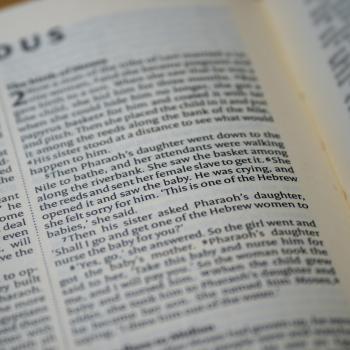On a weekly basis I take each of my three children out, one-on-one, to spend some quality time together. Part of that time involves going through some sort of study resource and the other part involves us going to get a meal, or a small toy of the equivalent price. It is a time we all look forward to and are sore if we miss it, yet my sentiments are probably a bit different than my children’s. I look to this as a formational time in their lives; I have the privilege of being able to pour into them and teach them about the Christian faith, whereas for now, they just see it as uninterrupted time with dad. Both of these aspects are vitally important to it though because I get to enjoy my children, and they get to enjoy their dad (and perhaps, an ice cream cone).
In one of these recent trips with my son, we spoke at length about what the grace of God is. One of the questions we worked through in our study on the book of Romans was this: if someone comes to you saying they’ve heard about the grace of God, but they don’t understand it, what would you tell them? Why is this good news? In other words: what is the grace of God and why in the world does anyone care about it? My son started off by speaking quite vaguely about how it is the kindness of God. I pressed him, “Ok. So God is kind. Who cares?” He looked at me, startled to hear me talk like that. I responded further, “Why does it matter to me if God is kind? Why do I care if God is kind?” Again, he gave me a puzzled look and explained hesitantly that we need God’s grace because we are sinners and God punishes sinners. “Ok!” I said, “Now we’re starting to get somewhere!”
Mind you, my son is nine and knows the gospel—but I pressed him because when we speak of God’s grace, vague answers just won’t do. God’s grace is specific. God’s grace is contextual. God’s grace is not just good news in the way we understand “good” today—it is the best news you can ever hear. God’s grace is indeed a kindness, but we can’t give this justice if we lack a clear explanation of what it is and why it actually is good news to hear of it. When someone comes to us and asks what the grace of God is and why it matters, we ought to be able to give them a clear answer and point them, unabashedly, to the fact that Jesus Christ died for our sins, that He was buried, that He rose on the third day, and by this sacrifice He actually accomplishes something. We ultimately point them towards this grand hope, which is that God actually forgives sinners.
All of this presumes the reality that there is bad news—and it isn’t just bad news for the worst of the worst in society—it’s bad news for everyone! No one can feign ignorance or claim solace in their skepticism or unbelief. No one will stand before God at the end of all days and claim He didn’t give sufficient proof of His existence; everyone is without excuse because God has plainly revealed Himself to them, and they have suppressed this truth in unrighteousness; they have pushed reality to the side in favor of worshiping the creation instead of the Creator (Rom. 1:18-32). Only the fool says in his heart, “There is no God!” (Pro. 14:1). Every individual stands condemned before the thrice holy Lord simply because they have inherited Adam’s sin nature (Rom. 5:12). Even without the guilt inherited through Adam, every man has violated God’s perfect standard (Rom. 3:23) and as a result stands condemned to an eternity in hell (2nd Thess. 1:9). They are slaves to sin (Rom. 6:16), pronounced dead in their sins (Eph. 2:1) far before they were even born (Ps. 51:5), and unable to accomplish forgiveness by their own efforts (Gal. 2:21).
The fact that Scripture says all of this about mankind and more is absolutely devastating, yet in another sense, it is radically comforting simply because of God’s grace. God forgives sinners. What’s more than this is that God has the audacity to forgive people that this world would consider the worst offenders of us all. He forgives those who confess Jesus as Lord and believe that God raised Him from the dead (Rom. 10:10-11). Indeed, whoever will call upon the name of the Lord will be saved (Rom. 10:13).
What that means, very plainly, is that God will indeed forgive rapists, murderers, pedophiles, cannibals, genocidal maniacs—you name it. There is no crime so heinous that it can outmatch the scandal of God’s grace to those He forgives. There is no sin so odious that it masks the pleasing aroma of the Son’s sacrifice on the cross on our behalf. No. There is nothing in all of time and space that can stand between the Father and the Son, if Christ is our Advocate. You may be the greatest sinner this world has ever seen, yet if you are in Christ, it cannot separate you from the love of God that is in Christ Jesus. If you can’t believe that God is able forgive a child-murderer, the child he murdered, and even yourself in one fell swoop of grace through Jesus Christ, you simply don’t know the gospel of grace. If you think grace goes to the deserving, especially as you define it, you don’t know the gospel.
Yet this is precisely what bears the focus of a man named Jake Eakin. If you are not aware of who Jake Eakin is, he was charged alongside Evan Savoie in the infamously brutal 2003 murder of a young autistic boy by the name Craig Sorger. The case made Washington state history because both Evan and Jake became the youngest defendants to be tried as adults. Both boys would go on to serve lengthy sentences in prison, yet Jake’s story invariably takes an incredibly interesting (and wonderful) turn.
In a recent Facebook post, Eakin wrote, “In 2016, three months before my sentence was up, I escaped. I fled my work release program in Yakima, WA and hitchhiked 300 miles to Idaho. From there I jumped on a bus to South Dakota, where U.S. Marshals captured [me] at gun point at a Rapid City bus stop…
…I served out the rest of my sentence in state prison before being transferred to county jail to be charged with 1st degree escape. I faced 5 more years in prison…
…In my cell, I began to read the Bible. Every hour that I was awake, I was reading it. I would spend five, six hours reading, then fall asleep, wake up, and begin reading from where I left off.
On January 7th, 2017 I remember falling on my knees and calling out to God to save me. I know that we are saved by repentance and faith, but at the point of conversion all I knew was that God loved me and I was saved. I remember getting up from the floor of my jail cell and it was like the old Jake Eakin stayed there dead, and a new Jake Eakin rose from the dead, and I knew that nothing would ever be the same again. The grace of God found me on the floor of a jail cell. He met me there and changed me forever.
I was born again.”
Jake continues on in the post to speak of the profound impact of the gospel upon his life, including his post-conversion work fighting against abortion.
I would encourage you to read the remainder of Jake’s testimony here, because not only is it an incredible testimony of God’s grace, but it has become a veritable scandal to those who cannot fathom a man like him being forgiven for his crimes (much of this, no doubt owing to his stance against the practice of abortion). If you read through the original post and any thereafter, they are filled with comments from individuals who say Jake’s mother should have aborted him, his crime is unforgivable, his “magic sky-daddy” doesn’t exist, he will burn in hell anyways, he’s the last person who has any right to speak against abortion, and he is any number of explicative-laden names. Perhaps the most common refrain from commenters is that he is a child-murderer and no child-murderer deserves to go to heaven. Frankly, they’re absolutely correct.
No child-murderer deserves heaven. No child-murderer deserves eternal paradise. Everyone has that exactly right when it comes to the story of Jake Eakin. He doesn’t deserve eternal rest, and he especially doesn’t deserve forgiveness, and yet, neither does anyone else in all of history. That’s the whole point of the gospel. The gospel was never designed to be this add-on to the life of socially decent people. Christ didn’t die for the generally accepted. Christ didn’t die for social rehabilitation, to give you a better marriage, to give you financial peace of mind, nor to fulfill some self-help program for somewhat functional people, where you pick yourselves up by the bootstraps and become productive members of society. Christ died for the worst of the worst—the hardened criminals and vagabonds—and that includes you, dear reader.
The problem is not so much that people have trouble with the notion that God can forgive people, not in some vague sense at least. People can accept that God forgives the one they would forgive. There’s nothing scandalous about this; there’s nothing positively frightening about the fact that God forgives some kid who stole a candy bar once several years back because we see the offense as a minor infraction. Yet when the tables are turned and you suggest that God forgives even the child-murderer, all hell breaks loose. Compound this by saying that the candy thief is equally in need of God’s grace as the murderer, and you drive people into an apoplectic rage. Touch the idol of abortion and call it for what it is (murder), as Jake Eakin has—and you’ve done the unforgivable.
The issue here is that people are too prideful to see that their own sins are equally as damnable as those of Jake Eakin. They’ve never done something that bad when you stack their lives against another. They’ve never murdered a fellow schoolmate—yet the funny thing is that God never plays the comparison game with another sinner, otherwise you might stand a chance. You might stand a chance as a candy thief going against a murderer, yet among the list of sins Paul gives that most people recognize are a terrible crime are those more socially acceptable sins. It is not just child-murderers who cannot inherit the Kingdom of God—it is the adulterer, the sexually immoral, the homosexual, the drunkard, the swindler, the liar, the gossiper, the greedy, the envious, the thief, etc. (Gal. 5:19-21; 1 Cor. 6:9-10). It is all of these people and more who are unworthy. It is both the one who has murdered someone in the flesh and the one who has murdered someone in his heart in anger that shall be liable to judgment (Matt. 5:21-22).
When we consider the reprehensible thoughts we’ve had in comparison to the despicable actions of others, there is a zero-sum game in the economy of God. We all deserve to die, and indeed we will if we do not turn in repentance through Christ. People clamor on about fairness, yet what’s fair is that we all wind up in Hell, with no chance of forgiveness or redemption. That’s what is fair. What’s fair is that Christ wouldn’t go to the cross because of your sin. What’s fair is that the piddly little clump of dirt God breathed life into wouldn’t put every bit of his energy and life into wholesale rebellion and rejection of his Maker. You don’t want fair. You want mercy and grace. You want God giving you what you do not deserve, which is forgiveness—and if you’re a sinner, that’s incredibly good news because God actually has the audacity to forgive sinners.
Jake Eakin knows this truth well, as well as the truth that forgiveness does not erase long-lasting consequences; he is but one murderer forgiven, calling out to other murderers or would-be murderers of a truth he had to learn in a terrible way: God is the God of the living, and not the dead. Jake came to understand that forgiveness could indeed come to the worst of the worst, despite the fears of his fifteen-year-old self that it would never happen. God’s grace is indeed scandalous. God’s grace is an affront to the world who cannot endure a message that says even the child-murderer can be forgiven. Yet this is a truth you must believe if you are to believe the Christian faith at all, because this is precisely the hope offered to those who don’t deserve any bit of it, which is all of us.
That God forgives the worst of the worst is an incredible comfort to the one who knows that he is the chief of sinners (1 Tim. 1:15). That God calls all men the worst of the worst is repulsive to the one who believes he is not in need of a physician (Mk. 2:17). If you don’t desire to worship a God like that, so be it, but far be it from me to suggest that you truly want justice. As far as it is concerned, the outcome of ultimate justice does not look good for the one who stands before God without Christ as his Advocate. Yet if Christ is the One who pleads for you, let it be known:
“You are a great sinner, but He is a greater Saviour. Do not say that you have matched Christ, or overmatched Him. Come, Goliath sinner, the Son of David can conquer thee or save thee yet: ‘Though your sins be as scarlet, they shall be as white as snow; though they be red like crimson, they shall be as wool’” (Charles Spurgeon).













